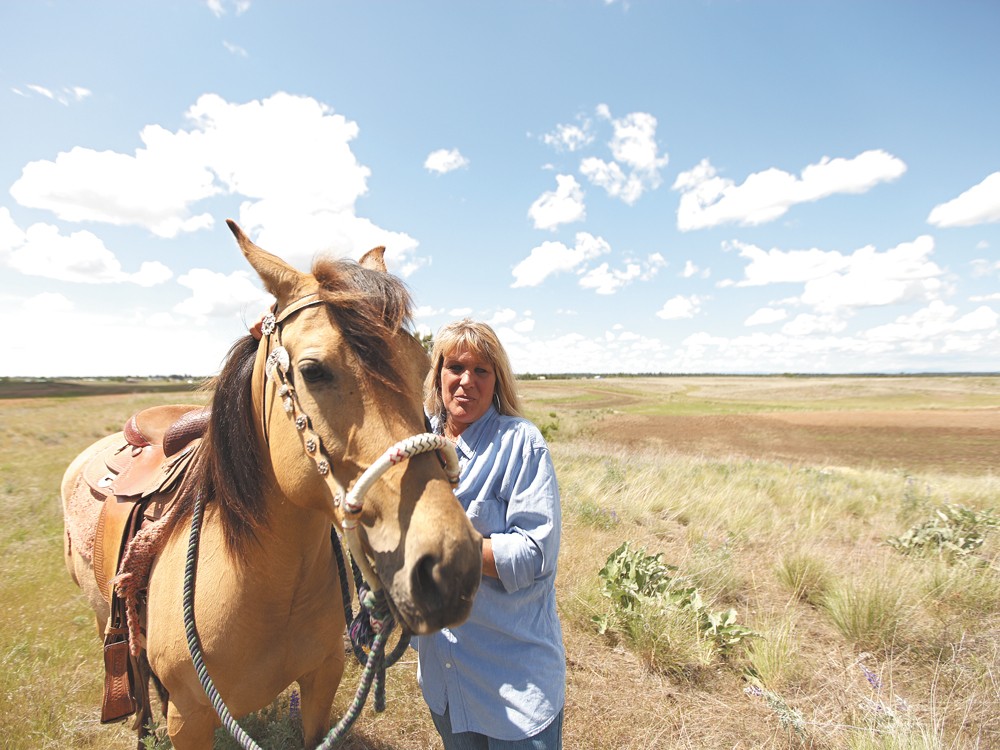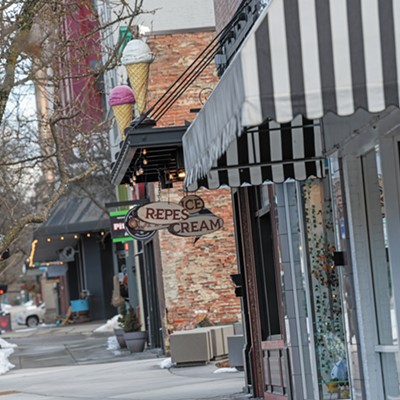
It’s easy to spot Lisa Long’s doublewide from the main gate of Fairchild Air Force Base. Look north across U.S. Highway 2, maybe a quarter-mile away on a rise in the open land. Long, 47, bought her five acres in Airway Heights 15 years ago for $22,500. It was a nice plot right underneath the base’s flight pattern. Something many people wouldn’t want, but it allows Long the space to keep her horses and a training pen.
“When I bought this 15 years ago, it was all alfalfa field,” says Long. But Airway Heights isn’t all fields anymore. A patchwork of new streets boasts tidy, cookie-cutter houses. Along Highway 2 — the main thoroughfare that splits the city in half — is a fresh layer of commerce, clusters of strips malls and eateries. In the last decade the city grew 35 percent, from 4,500 people in 2000 to 6,114 people in 2010.
It’s not exactly the wilderness of Long’s arrival.
Indeed, the city sits at an intersection of booms: of population growth, a second proposed casino and the prospect of a new fleet of air tankers at Fairchild.
Meanwhile, a tug of war over the city’s future spreads farther out, to the city of Spokane, and Spokane County. As officials in these parts line up to oppose the casino, and in some cases, growth in general in Airway Heights, this little city seeks its own path.
“If it was done wisely, Airway Heights should have had the ability to be very comparable to Spokane Valley,” says Patrick Rushing. “What happened in Airway Heights that stopped that development from happening?” Rushing, the city’s mayor, returned to Airway Heights in 1995 after 20 years in the U.S. Army. There hadn’t been much change, he says, since he left in 1975. Rushing, now 54, was an intelligence officer who flew as a navigator and photographer in Mohawk reconnaissance planes. Wiry and good-humored, he sits down to a burrito last week at a restaurant not far from the air base. As he eats, KC-135 tankers descend by the storefront window, on final approach to Fairchild.
Rushing envisions a Highway 2 turned into a more attractive thoroughfare, a tree-lined boulevard where companies want to build their headquarters. He sees plenty of room for the city to build more housing, so military families don’t have to live 15 miles from the base.
But these ambitions need at least two things Airway Heights may not get: water for new homes and businesses, plus a workable growth plan. When the City of Airway Heights, for instance, prepared in May to consider a new water contract with the City of Spokane, Rushing learned that their larger neighbor next door had put that conversation on hold.
Rushing says a Spokane city official told him that it was because Airway Heights doesn’t agree with a land-use plan recently approved by Spokane. Known as the Joint Land Use Study, or JLUS, the plan was an attempt between four partners — the city and county of Spokane, Airway Heights, and Medical Lake — to draw growth boundaries that would protect Fairchild against future base closures.
Rushing recalls being told, “Why would they sell water to us if we don’t agree with their policy on JLUS?” Spokane city officials dispute that account.
Rushing wasn’t told that the contract was offlimits to Airway Heights because of JLUS, according to city spokeswoman Marlene Feist. And the proposed water contract is currently being tweaked, and it’s not off the table, Feist says.
What officials in both cities agree on is that the future of development is tied to water use, and that right now that future isn’t so clear. One debate is over whether a city without water should continue growing.
Feist says that haggling over a new water contract has been going on for years.
“We haven’t reached a conclusion on it,” Feist says, adding that former Mayor Mary Verner “was opposed to it on principle. She didn’t want growth in areas that couldn’t support themselves in resources.”
“Spokane’s
got so much water that ... they don’t have the ability to use [it
all],” Rushing says. “So why not share that with others and spread that
so the entire region can benefit, not just the city of Spokane?” Rushing
and Feist say the two cities are kicking around the idea of putting
together a regional water committee that would help coordinate their
differing visions.
The land study is being used, ostensibly, to protect Fairchild. But Fairchild has also become the rallying cry for those opposing the Spokane tribe’s proposed casino, which they say would threaten the future of the base. The tribe wants to build its casino, hotel rooms and shopping north of Highway 2 — not far from Fairchild or the Kalispels’ Northern Quest Casino.
Rushing supports the proposed casino and says it won’t impact the base, because Airway Heights uses federal land-use guidelines to make sure Fairchild is protected from “encroachment,” or development too close to the base.
But much of Spokane’s power structure has lined up behind the base at any cost. The Spokane City Council passed a resolution against the casino, and Mayor David Condon voiced his opposition to it. Greater Spokane Incorporated, the region’s chamber of commerce, likewise has made a strong push against the project. On its website, GSI encourages both Airway Heights and Medical Lake to sign onto the document.
But if Airway Heights signs off on the land-use plan, Rushing says, it won’t have anywhere to develop. And that means a water contract with the City of Spokane would be a moot point.
“They took a scientific document and made it political,” he says of the proposed land-use plan.
Those boundaries will also halt most growth in Medical Lake, according to Mayor John Higgins.
“We’re probably in even more hot water than Airway Heights,” Higgins said over the phone recently. “Whether we can expand or not expand, they can take all that away from us.”
Higgins says that if Medical Lake, an old town southwest of Fairchild, doesn’t sign onto the JLUS, the Spokane County Commission can retaliate by not supporting future growth areas.
“They want everybody to fall in line,” Higgins says. “They’re just gung-ho for it, and that’s how they’re going to do it.”
Both Airway Heights and Medical Lake have city attorneys looking for possible solutions.
And Higgins says he is meeting with county officials this week.
For his part, Spokane County Commissioner Al French says Fairchild, which fuels
about 5,700 jobs, is too important to gamble on.
“You want to play Russian roulette and take a gamble and put the base at risk?” asks French.
French says the county is open to working with the communities to redraw some of the boundaries, but he says the commission is willing to exert its authority over communities threatening Fairchild.
“I
think ‘retribution’ is a strong word,” French says, adding, “Clearly I
think the county had made a statement that we’re invested in protecting
the assets of the Air Force base.”
In Airway Heights, there’s some skepticism about the dire warnings being issued by public officials. As he sits at a counter of the cavernous Hicks Hardware store, owner Claude Hicks helps a customer find electrical outlet splitters. “Go in Aisle 13, approximately, maybe eight feet on your left on the top shelf,” he says, before giving his own opinion on Fairchild.
“The city of Airway Heights is going to have no bearing on Fairchild Air Force Base, pro or con,” says Hicks, 78.
Hicks says he supports the Spokane tribe’s casino proposal as a matter of “equal opportunity, more than anything” since the Kalispel tribe has its casino, Northern Quest, also near the base.
But Hicks, himself a former Airway Heights City Council member, believes that without or without the casino, the base isn’t going anywhere.
“They missed the chopping block so many times since 1960,” he says.
Lisa Long, who owns the horses across from Fairchild, says she’d like “everybody to get together and discuss the planning and looking for the future of where Airway Heights is going to be in 20 years.”
She adds: “I don’t think things are really well laid-out right now.”




















